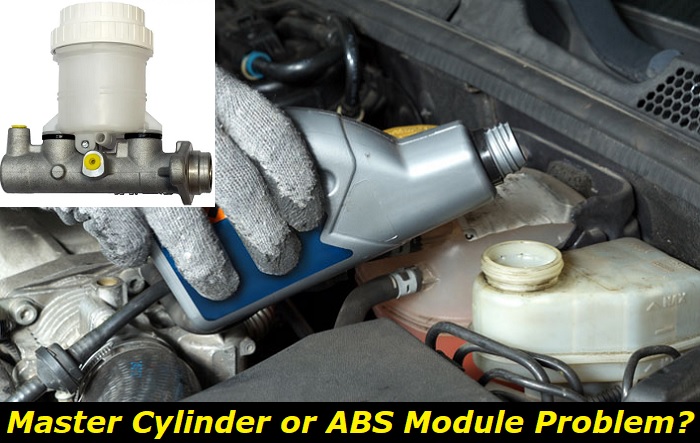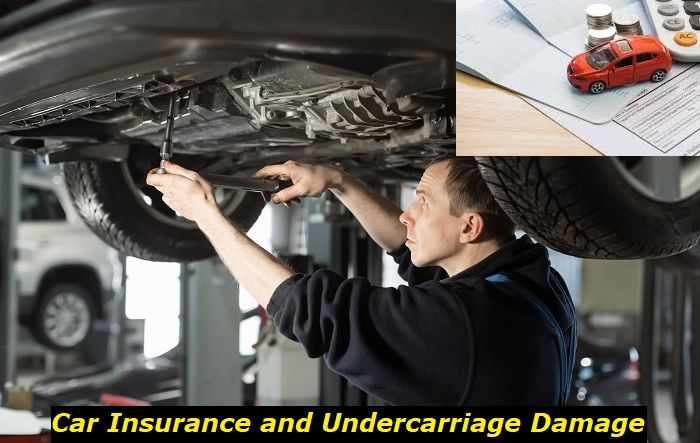When your car's brakes suddenly go out, the problem might be the brake master cylinder or the ABS module. Since the two are integral parts of your car's braking system, it's often hard to tell which one is to blame for your braking troubles. At times, some professional mechanics also tend to get confused about their initial diagnosis of problems relating to the two until they conduct a more thorough evaluation of the issue.
Common brake problems highlights
- Level of urgency:super-urgent
- DIY diagnostics:possible but not recommended
- DIY repairs:impossible
- Price for repair:$150 - $450
- Common symptoms:issues with braking, car brakes on its own, brakes are inefficient, sounds when braking
- Commonreasons:fluid issues, caliper problems, cylinders problems, brake booster issues
- If ignored:no brakes, accidents, dangerous situations

How the Master Cylinder Works
The master cylinder is a hydraulic component in a vehicle's braking system. It is mounted on the firewall, which is the thin sheet of metal between the engine and the driver and front passenger compartment of a car. The master cylinder is typically near the brake pedal within the said location.
The master cylinder contains two pistons that push brake fluid through the brake lines to the brake calipers. When you step on the brake pedal, it pushes one of the pistons in the master cylinder, which sends fluid to the brakes. The master cylinder is a crucial safety component in your vehicle, so it's important to keep it in good working order at all times.
If you notice that your brake pedal feels spongy or it tends to sink to the floor when you step on it, this is a sign that there may be a problem with your master cylinder. In addition, if fluid is leaking from the master cylinder, it can also cause plenty of issues.
There are some common problems that can occur with the master cylinder. One is that the piston seals may wear out, which can cause fluid to leak. Another issue can be caused by air bubbles in the system, which can make the brake pedal feel spongy. And finally, if the master cylinder becomes corroded, it can eventually fail.
If the piston seals wear out, you can replace them. If air bubbles are causing the brake pedal to feel spongy, you can bleed the system to get rid of them. And if the master cylinder becomes corroded, you can clean it and coat it with a corrosion inhibitor.
Should you encounter any of these, have your master cylinder checked by a mechanic as soon as possible.
How the ABS Module Works
The ABS module is a component in a vehicle's braking system that prevents the car from skidding. It does this by monitoring the speed of each wheel and activating the brakes on the appropriate wheel if it senses that the car is about to slip.
Similarly, the ABS module is typically located near the braking system within the firewall. It is positioned between the brake master cylinder and the wheel brakes. This part works together with the master cylinder and other brake components to ensure that you have maximum control when braking, which can help you avoid accidents.
The ABS module has several parts, these include a control unit that monitors the speed of each wheel and activates the brakes on the appropriate wheel if it senses that the car is about to slide, sensors that are attached to each wheel and monitor the speed of the wheel, a pump that circulates brake fluid through the system, and valves that open and close to allow brake fluid to flow to the appropriate wheel.
If one of these parts fails, it can cause the ABS to malfunction. In some cases, the ABS light on the dash will come out if there's a fault within the system.
Some symptoms can indicate a problem with the ABS module. One is that the ABS light on the dash will come on. Another is that the brakes may feel like they are pulsating when you apply them. And finally, the car may skid more easily than usual, even in dry weather conditions.
One common problem with the ABS module is that the control unit may fail. This can cause the system to malfunction and the ABS light on the dash to come on. Another is that the sensors may become dirty or damaged, which can hinder them from accurately monitoring the speed of each wheel. And finally, the pump may wear out or become clogged, which can thwart it from circulating brake fluid through the system.
If the piston seals wear out, you can replace them. If the brake pedal feels spongy, you can bleed the system or change the problematic part. And if the master cylinder becomes corroded, you can clean it and coat it with a corrosion inhibitor or replace it as needed.
If one of these parts fails, it can cause the ABS to malfunction. In some cases, the ABS light on the dash will come on if there is a problem with the system.
There are several solutions to common problems with the ABS module. If the control unit fails, you can have it recalibrated via ECU flashing or replace it. If the sensors become dirty or damaged, you can clean or replace them. And if the pump becomes clogged, you can either clear the contaminant or change it.
It's important to have your ABS checked by a mechanic as soon as you feel any problems with it. This can help avoid accidents and keep you safe on the road.
Master Cylinder vs ABS Module: How to Tell Their Problems Apart
When it comes to your car's braking system, the master cylinder and ABS module are two important yet separate components. As discussed earlier, the master cylinder is mechanical in nature and is responsible for supplying brake fluid to the brakes. On the contrary, the ABS module is an electrical component that helps prevent the car from skidding.
If either of these parts fails, it can cause serious problems. However, it can be quite tricky to tell their issues apart, and even professional mechanics can sometimes misdiagnose a fault between the master cylinder and the ABS module.
One way to tell the difference between a problem with the master cylinder and a problem with the ABS module is by looking at the symptoms. If you experience a problem with the ABS module, one symptom may be that the brakes feel like they are pulsating when you apply them. Another sign may be that the car skids more easily than usual, even in dry weather conditions.
On the other hand, if you have a problem with the master cylinder, one symptom may be that the brake pedal feels spongy. Another symptom may be that the car's braking distance increases. Lastly, leaks can originate from this part.
In some instances, the signs of failure in both the master cylinder and ABS module can happen all at once, which can definitely complicate matters. Such an event may mean that both the master cylinder and ABS module have to be replaced.
It's important to keep an eye on both the master cylinder and ABS module, as they are both crucial to the braking system. If either of them starts to show problems, it's important to have the car checked by a mechanic as soon as possible.
This can help avoid accidents and keep you safe on the road. Likewise, a mechanic is better equipped and trained to conduct a more thorough diagnosis which can determine if a problem is only confined within the master cylinder, in the ABS module, or both.
Ways to Avoid Master Cylinder and ABS Module Problems
Both the master cylinder and ABS module are important components of a car's braking system. If either of these parts experiences problems, it can lead to serious consequences. However, there are ways to avert potential problems in these parts from happening in the first place.
Here are some tips on how to avoid master cylinder and ABS module problems:
- Regularly check the level of brake fluid in the reservoir and top it up if necessary.
- Inspect the brake hoses for any leaks, cracks, or damage.
- Check the condition of the brake pads and discs. If they are worn out, replace them.
- Be sure to bleed the brakes regularly to remove any air bubbles from the system.
- If you notice any issues with either the master cylinder or ABS module, have the car checked by a mechanic as soon as possible.
- Make sure to always use high-quality replacement parts when conducting repairs or maintenance on the braking system.
- Regularly check the alignment of the car.
- See to it that the tires are inflated to the recommended pressure.
- Avoid drifting and driving on rough roads or in icy conditions.
- If the ABS light turns on, take the car to a mechanic for a diagnosis.
By following these tips, you can prevent, or at least mitigate, the problems connected to the master cylinder and ABS module problems from ever occurring.
Conclusion
The master cylinder and ABS module are both vital components of a car's braking system. If either of them starts to display problems, it's a must to have the car checked by a mechanic as soon as possible. Doing so is your key to staying safe on the road at all times.
Furthermore, a mechanic is better armed and skilled to conduct a more thorough diagnosis which can determine if a problem is only confined within the master cylinder, in the ABS module, or both. With that, he/she is in a better position to identify and apply a more accurate solution to the troubles you are having with your braking system.
About the authors
The CarAraC research team is composed of seasoned auto mechanics and automotive industry professionals, including individuals with advanced degrees and certifications in their field. Our team members boast prestigious credentials, reflecting their extensive knowledge and skills. These qualifications include: IMI: Institute of the Motor Industry, ASE-Certified Master Automobile Technicians; Coventry University, Graduate of MA in Automotive Journalism; Politecnico di Torino, Italy, MS Automotive Engineering; Ss. Cyril and Methodius University in Skopje, Mechanical University in Skopje; TOC Automotive College; DHA Suffa University, Department of Mechanical Engineering






Add comment